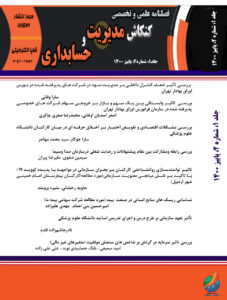مقاله: پژوهشی
صفحه: 131-145
نویسندگان:
صادق جلالی[1]*، ساره جعفری[2]، فرشته محبی[3]
[1] گروه مدیریت ورزشی، دانشگاه علامه طباطبایی، تهران، ایران
[2] گروه مدیریت ورزشی، دانشکده علوم ورزشی تهران، تهران، ايران
[3] دانشجوی دکتری، دانشگاه تربیت مدرس، تهران، ايران
چكيده
هدف از این پژوهش بررسی عوامل موثر بر قصد کارآفرینی فارغالتحصیلان رشته علوم ورزشی و تئوري رفتار برنامهریزی شده میباشد. جامعه آماری پژوهش حاضر فارغالتحصیلان رشته علوم ورزشی دانشگاههای سراسری سطح شهر تهران بود؛ که تعداد 120 نفر بصورت روش نمونهگیری در دسترس انتخاب شدند. ابزار اندازهگیری این پژوهش پرسشنامه استاندارد می باشد. که توسط پژوهشگران مختلف روایی سنجی و پایایی سنجی شده است. بهمنظور تائید یا رد رابطه میان متغیرهاي مطرح پس از محاسبه ضریب همبستگی و تعیین شدت رابطه بین متغیرهاي مستقل و وابسته، از تحلیل رگرسیون چندگانه استفاده گردید. با توجه به تفاوت میان متغیرها از آزمون فریدمن بهمنظور اولویتبندی متغیرها استفاده گردید. یافتهها نشان داد ابعاد تئوری رفتار برنامه ریزی شده با قصد کارآفرینی دانشجویان تربیتبدنی رابطه معناداری داشت. همچنین نتایج حاصل از آزمون رگرسیون نشان داد، سه بعد تئوری رفتار برنامه ریزی شده شامل نگرش نسبت به رفتار، کنترل رفتاری درک شده و هنجارهای ذهنی بر قصد کارآفرینی دانشجویان تربیت بدنی تاثیر معناداری داشت. همچنین نتایج حاصل از رتبهبندی ابعاد تئوری رفتار برنامه ریزی شده نشان داد به ترتیب نگرش نسبت به رفتار، کنترل رفتاری درک شده و هنجارهای ذهنی دارای بالاترین اولویت بودند.
کلمات کليدي: قصد کارآفرینی، نگرش رفتار، هنجارهاي ذهنی، کنترل رفتاري، خودباوري کارآفرینانه
Factors affecting the entrepreneurial intention of graduates in the field of sports science and the theory of planned behavior
-
Sadegh Jalali[1], Sareh Jafari[2]. Fereshteh Mohebi[3]
[1] Masters, Department of Sports Management, Faculty of Sports Sciences, Allameh Tabatabai University, Tehran, Iran
[2] 2. Masters, Department of Sports Management, Faculty of Sports Sciences, Tehran University, Tehran, Iran
[3] 3. PhD student, Department of Sports Management, Faculty of Sports Sciences Tarbiyat Modares University, Tehran, Iran
Abstract
The purpose of this study is to investigate the factors affecting the entrepreneurial intention of sports science graduates and the theory of planned behavior. This research is applied in terms of purpose and survey type in terms of data collection method. The statistical population of the present study was the graduates of sports sciences from national universities in Tehran. 120 people were selected by available sampling method. The measurement tool of this research was a standard questionnaire that has been validated and validated by various researchers. In order to confirm or reject the relationship between the variables, after calculating the correlation coefficient and determining the intensity of the relationship between independent and dependent variables, multiple regression analysis was used. Due to the differences between the variables, Friedman test was used to prioritize the variables. Findings showed that the dimensions of the theory of planned behavior had a significant relationship with the entrepreneurial intention of physical education students. Also, the results of the regression test showed that the three dimensions of the theory of planned behavior, including attitudes toward behavior, perceived behavioral control, and mental norms had a significant effect on the entrepreneurial intention of physical education students. Also, the results of ranking the dimensions of the theory of planned behavior showed that attitudes toward behavior, perceived behavioral control, and mental norms had the highest priority, respectively.
Keywords: Behavioral Attitude; Behavioral Contro, Entrepreneurial Intention; Entrepreneurial Self-Confidence; Mental Norms.
